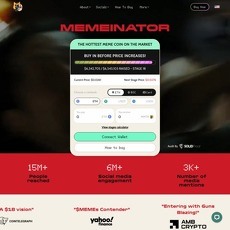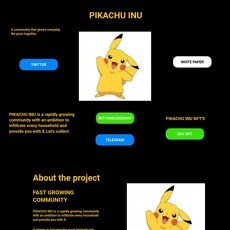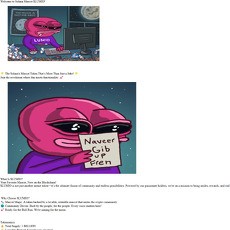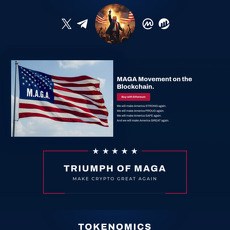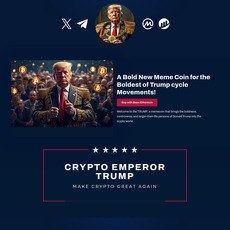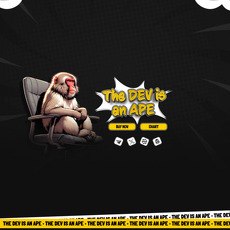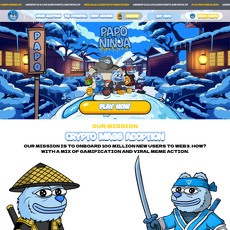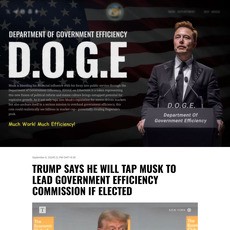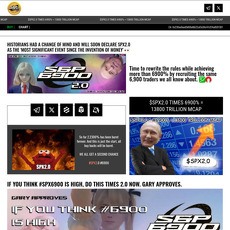Joseon Mun Review
Joseon Mun
joseon.com
If your website is on the scam list and you think that you are not a scammer, contact us. After you provide us with all the proof that you are in Crypto World with good intentions, we will delist you. Usually, you get in this category because you are hiding your team, you have a bad reputation(you are tricking, deceiving, scamming people), and you haven't got a written project whitepaper or is a shitty one....
Their Official site text:
Joseon
The First Cyber
Nation-State
Recognized by a
UN Member Nation
THE DOCUMENT IS PROVIDED "AS IS", WITHOUT WARRANTY OF ANY KIND, EXPRESS OR
IMPLIED, INCLUDING BUT NOT LIMITED TO THE WARRANTIES OF MERCHANTABILITY,
FITNESS FOR A PARTICULAR PURPOSE AND NONINFRINGEMENT. IN NO EVENT SHALL
THE AUTHORS OR COPYRIGHT HOLDERS BE LIABLE FOR ANY CLAIM, DAMAGES OR
OTHER LIABILITY, WHETHER IN AN ACTION OF CONTRACT, TORT OR OTHERWISE,
ARISING FROM, OUT OF OR IN CONNECTION WITH THE DOCUMENT OR THE USE OR
OTHER DEALINGS IN THE DOCUMENT. THIS DOCUMENT DOES NOT CONSTITUTE AN
OFFER TO SELL MUN. PLEASE REFER TO THE SAND AND THE SAND SUMMARY FOR THE
TERMS OF PURCHASE OF MUN.
Copyright © 2023 Joseon 2
“The rebirth of JOSEON as a sovereign nation-state with its currency as its
source of self determination to provide a system of equity in education,
access to goods and services and a desirable quality of life are exciting and an
equivalent to the declaration of universal human rights.”
—— The Honorable Mike Honda
Member of U.S. Congress (2001-2017)
DNC Deputy Chair (2003-2005)
DNC Vice Chairman (2005-2013)
Copyright © 2023 Joseon 3
“I’m glad to see that the first nation-state to issue a blockchain based
currency is doing it to empower individuals rather than to control them.”
—— Roger Ver
Chairman of Bitcoin.com
Founding Member of the Bitcoin Foundation
Known as “Bitcoin Jesus”
Copyright © 2023 Joseon 4
“A network state is a highly aligned online community with a capacity for
collective action that crowdfunds territory around the world and eventually
gains diplomatic recognition from pre-existing states.”
1
—— Balaji Srinivasan
As stated by Dr. Srinivasan in his book,
“The Network State”
1
1 Srinivasan, Balaji. “The Network State.” 2022. https://www.amazon.com/dp/B09VPKZR3G.
Copyright © 2023 Joseon 5
“Our goal … is to bring back the Wild Wild West that we loved so much,
because it creates a system in which people are able to learn what they wish
to learn, say what they wish to say, experience what they wish to experience,
and create what they wish to create. I know this sounds corny, but an internet
without boundaries or limitations, in which we can achieve our dreams, is our
goal.
I would like to see change. I understand that a single lifetime is limited and
only so much can be accomplished. However, there are things that cause pain,
suffering and stress that we can really make trivial with the use of technology.
In 50 years, I hope to be alive on Earth. However, if I am not, I hope to be
known in history as a man who helped bring ‘happiness’ to this world.”2
—— Andrew Lee
In an interview from 2013
2 Zaborszky, Pete. “An Interview with Private Internet Access Founder Andrew Lee.” Pro Privacy, August 21, 2013,
https://proprivacy.com/privacy-news/an-interview-with-private-internet-access-founder-andrew-lee
Copyright © 2023 Joseon 6
It's been 10 years since I made this statement, 11 years after I declined joining Ripple’s
leadership for 6% of all of the XRP coins, and 12 years since I voluntarily left the world's
leading Bitcoin exchange while serving as the first president of its North American
subsidiary.
In 2012, Jed McCaleb, founder of Ripple and Stellar, emailed me and asked, "I am
curious what you guys are going to do instead?"
"It's time for us to step up and change the world for the better too Jed (sic). We look up to
you, and we will certainly follow your footsteps. Please keep improving the world so we
can always have someone great to chase after," was my response.
So it was that I, and those around me, began our long journey toward the same goal that
everyone in the Crypto Wars
3
longed for, but the path, that I felt was necessary, contrasted
greatly with the overall consensus among technologists in the space – for I had
experienced what many had yet to fully appreciate – the frictions and hardships of trying
to force an enormous circle into a small square. Existing laws and policies were unfit for
the advancements brought with computing, the internet and, more specifically,
cryptocurrencies. I still remember the day a banker at Wells Fargo, a company once
convicted of theft and creating fraudulent bank accounts, called me a criminal simply for
asking to open up a bank account for a company that accepted cryptocurrencies as a form
of payment for a service.
The excitement brought by new technology, especially blockchain, caused an exorbitant
number of groups to rush into the space and race toward the goal of achieving widespread
adoption of various cryptocurrencies. However, blockchain does not exist in a vacuum –
it exists within a social, legislative and commercial infrastructure built by states, societies
and individuals over the years. Legislation already prohibits most of the projects in this
space – essentially making most projects non-starters. And further, legacy players in the
finance industry have done their best to reduce the potential for further blockchain
developments.
3 Lee, Andrew. “Why I Hired Mt. Gox ex-CEO Mark Karpeles as CTO of London Trust Media.” Privacy Online News, April 24, 2018,
https://www.privateinternetaccess.com/blog/why-i-hired-mt-gox-ex-ceo-mark-karpeles-as-cto-of-london-trust-media/
Copyright © 2023 Joseon 7
I share an old adage:
When a dog is separated from a bone by a fence, he will try to claw and
gnaw his way in a direct path to the bone, but he will fail. However, some
dogs walk along the fence, seemingly away from the bone, until there is no
more fence, and then they are able to take a direct path without resistance
to the bone.
Until now, all of the amazing innovators and activists in the blockchain space have been
moving toward the right goal, but the direct path was, as it often is, the wrong path from
the beginning.
Today, Ripple is embroiled in a massive lawsuit with the SEC.
4
I hope Ripple wins, but
fitting a beautiful, enormous circle into a small square has proven to be quite difficult.
For us, we walked along the fence in a direction that seemed, at the surface, quite distant
from the original objective. In 2018, I was named the heir to the Joseon Empire by King
Yi Seok.
5 With Joseon as our nation, we have, in just a few years, reaffirmed our status
through diplomatic recognition as a nation-state, gaining all of the rights and capabilities
of a “Network State.”
6 After a decade, we have arrived at the starting line and control our
own independent and legal jurisdiction – where our laws are driven by our ideals.
We’re around the fence.
I would like to introduce you to Joseon, the first cyber nation-state recognized by a UN
member nation. It is an honor and privilege to have you with us on our journey, as we
change the world to create happiness through greater equality.
Sincerely,
Andrew Lee
King of Joseon
6 Srinivasan, Balaji. “The Network State.” 2022. https://www.amazon.com/dp/B09VPKZR3G.
5 Smith, Nicola. “Korea’s unexpected prince aims to be a kingmaker for startups.” The Sunday Telegraph, December 30, 2018,
https://www.pressreader.com/uk/the-sunday-telegraph/20181230/281883004463900
4 SEC. “SEC Charges Ripple and Two Executives with Conducting $1.3 Billion Unregistered Securities Offering.” December 22, 2020,
https://www.sec.gov/news/press-release/2020-338
Copyright © 2023 Joseon 8
Contents
Abstract 13
On Sovereignty 13
1. The Status of Joseon 17
1.1 National Recognition 18
2. Joseon’s Relations With Other States 18
2.1 Introduction 18
2.2 Treaties 18
2.2.1 New Treaties 18
2.2.2 Historic Treaties 18
3. Joseon Denizenship 19
4. Jurisdiction 20
5. Closing Remarks 21
Equalizing Opportunity: Joseon’s Companies Act of 2023 22
6. Inspired by King Sejong the Great 22
6.1 Contemporary Disparity 23
6.2 Failed Attempts at Addressing Disparity 23
7. Joseon Companies Act of 2023 24
7.1 The Joseon Blockchain 24
7.1.1 Blockchain in Other Jurisdictions 24
7.1.2 Blockchain in Joseon 25
7.1.3 Joseon Blockchain Attributes 25
7.1.3.1 Corporate Ownership Tokenization 25
7.1.3.1.1 Smart, Zero-Trust Corporate Controls 25
7.1.3.1.2 Raise Capital Efficiently 26
7.1.3.1.3 Pay Salaries with Tokens 27
7.1.3.1.4 Shared Ownership 27
7.1.3.1.5 Mergers and Acquisitions 27
7.1.3.1.6 Investor Benefits 28
7.1.3.2 Political and Economic Freedom 28
7.2 Blockchain Custodial Department 28
Copyright © 2023 Joseon 9
7.3 The Mun Currency 29
7.3.1 Mun Monetary Policy 29
7.3.2 Mun Supply and Allocation 30
7.4 Closing the Wealth Gap 31
7.4.1 Joseon is Truly Borderless 31
8. Partnership of Ministry of Patronage and Sovereign Wealth 32
9. Closing Remarks 34
Copyright © 2023 Joseon 10
In honor of our Joseon ancestors and our heritage.
Copyright © 2023 Joseon 11
Some parts of this document are graphic in detail. Korea, the forgotten nation and its
people, has been forced into a culture of silence as it relates to its own history. Much of
this history is not common knowledge. History is about people. We therefore believe
people must be the priority, not any nation, its borders, or its legal recognitions thereof.
Victims, and the atrocities they experience, deserve to be heard. Further, we all must learn
to make sure these types of events are not repeated.
Joseon’s legacy, the Korean legacy, is no exception.
Copyright © 2023 Joseon 12
Abstract
Joseon is the non-territorial successor state to the Joseon Empire which was founded in
1392. Reconstituted as a cyber nation, Joseon is engaged in humanitarian efforts to
expand its global impact. As the first sovereign cyber nation, Joseon is introducing the
legal concept of a personal interest corporation (“Denizen”), decoupling identity and
reputation from a physical person. By deploying the Mun, a fiat blockchain
cryptocurrency in its own jurisdiction, Joseon is able both to (i) develop its own
regulatory environment designed to maximize the native benefits of blockchain
technology and (ii) issue a national currency with the benefits of a cryptocurrency.
Denizens will be able to conduct business activity with significantly less friction and
greater benefit from smart, “zero-trust” corporate controls. To encourage and support
entrepreneurship, Joseon intends to launch a fund to help capitalize credible business
initiatives started by Denizens in Joseon. As studies show that entrepreneurial activity
reduces the wealth gap, it is Joseon’s belief that its business ecosystem will help facilitate
humanity’s journey toward greater systemic equality.
On Sovereignty
Joseon is the successor state to the Joseon Empire, which was founded in 1392 on the
Korean Peninsula by Sung Gyeh Lee. Once known as the “hermit kingdom,”
7
it practiced
a policy of extreme isolation, sinking foreign ships that attempted to sail near its shores,
8
including those of the United States of America. After over a decade of arduous
courting,
9
in 1882 the U.S. successfully entered into a treaty of perpetual friendship with
the Joseon Empire, with both governments pledging, pacta sunt servanda, to protect each
other from unjust or oppressive acts.
10 Subsequently, the Joseon Empire executed eight
more near identical treaties with the world’s great powers, opening its borders and its
economy to foreigners.
10 Joseon and the USA. “Treaty of Amity and Commerce.”
https://digitallibrary.usc.edu/asset-management/2A3BF1O0T8DCM?FR_=1&W=1164&H=564
9 Mansfield, Mike. “American diplomatic relations with Korea (1866-1910).” University of Montana 1934.
https://scholarworks.umt.edu/etd/4711/?utm_source=scholarworks.umt.edu%2Fetd%2F4711&utm_medium=PDF&utm_campaign=PDFCoverPa
ges
8 Mansfield, Mike. “American diplomatic relations with Korea (1866-1910).” University of Montana 1934.
https://scholarworks.umt.edu/etd/4711/?utm_source=scholarworks.umt.edu%2Fetd%2F4711&utm_medium=PDF&utm_campaign=PDFCoverPa
ges
7 Griffis, W. (2015). Corea, the Hermit Nation (Cambridge Library Collection - East and South-East Asian History). Cambridge: Cambridge
University Press. doi:10.1017/CBO9781316134443
Copyright © 2023 Joseon 13
Upon the arrival of the 20th century, despite the existence of the “everlasting”
11
treaty of
friendship between the Joseon Empire and its “elder brother,”
12 and continuous calls for
assistance therewith,
13, 14
the U.S. breached said treaty by negotiating a secret treaty
15 with
Japan to permit the invasion of the Joseon Empire,
16
resulting in the annexation of Korea
by Japan at swordpoint,
17, 18 and the subsequent invasion of Japan’s military and police
forces. Thus was fulfilled President Teddy Roosevelt’s wish of seeing “Japan have
Korea,”
19 which he regarded as a “degenerate state.”
20
This marked the beginning of a half century of hardships, including the attempted
eradication of Korean language and culture through forced adoption of the Japanese
language and names,
21
in addition to wartime depredations including enslavement
22
,
systemic rape
23 and arbitrary killing.
24
In 1945, when Japan surrendered to the U.S. – the
very nation that had handed it the Joseon Empire – Koreans believed they had been
liberated. Instead, the U.S., without plan,
25 made the decision to invade and occupy “its
enemy”,
26 Korea, as U.S. General John Hodge called it. Contemporaneously, the Soviet
Union entered Korea from the north. Thus, the U.S. created, and the Soviet Union agreed
to, a line at the 38th parallel,
27 dividing Korea without input from any Koreans.
27 Wilz, John Edward. “United States Policy vis-a-vis Korea.” 1992. https://www.usafa.edu/app/uploads/Harmon35.pdf. Page 5.
26 Stueck, William and Yi, Boram. “‘An Alliance Forged in Blood’: The American Occupation of Korea, the Korean War, and the US–South
Korean Alliance.” The Journal of Strategic Studies (2010) , 33:2, 177-209, DOI: 10.1080/01402391003590200. Page 183
25 Schnabel, James F., Chief Historian of the US Military. “UNITED STATES ARMY IN THE KOREAN WAR.”
https://apps.dtic.mil/sti/pdfs/ADA353574.pdf. Page 20.
24 Yamada, Shoji. “What happened in the area of Greater Tokyo right after the Great Kanto Earthquake.”
http://www.cgs.c.u-tokyo.ac.jp/download/cgs03_01_yamada
23 Adamek, Rachel. “Korean ‘Comfort Women’ of WWII: Cultural Trauma and Formation of National Identity.” (2021)
https://scholarworks.seattleu.edu/intl-std-theses/2/
22 Kim, Tong-Hyung. “South Korea plans fund to compensate forced labor victims.”
https://apnews.com/article/south-korea-business-government-tokyo-seoul-fe50b12fc101a604c397cd32de964e10
21 Chee, Alexander. “My Family’s Shrouded History is Also a National One for Korea.” New York Times.
https://www.nytimes.com/2020/08/27/magazine/korea-japanese-occupation-surrender-ww2.html
20 Métraux, Daniel A. “George Kennan’s Influential 1905 Depiction of Korea as a ‘Degenerate State’ and Japan as its Gracious Savior.” 2016.
https://asian.fiu.edu/projects-and-grants/japan-studies-review/journal-archive/volume-xx-2016/metraux-daniel-kennan-and-korea-for-jsr-2.pdf
19 Bradley, James. “The Imperial Cruise: A Secret History of Empire and War.” https://erenow.net/ww/the-imperial-cruise/12.php.
18 Wilz, John Edward. “Did the United States Betray Korea in 1905?” Pacific Historical Review 54, no. 3 (1985): 243–70.
https://doi.org/10.2307/3639632. Page 20.
17 This Treaty was neither endorsed or signed by the King and was eventually found to be null and void by the Treaty on Basic Relations of 1965
(see footnote 60).
16 The Taft and Katsura Memorandum (Agreement)
15 108th Congress, 2nd Session. “Constitution of the United States of America: Analysis, and Interpretation - 2002 Edition.”
https://www.govinfo.gov/app/details/GPO-CONAN-2002/GPO-CONAN-2002-8-3
https://www.govinfo.gov/content/pkg/GPO-CONAN-2002/pdf/GPO-CONAN-2002-8-3.pdf. Page 96.
14 Kim, Ki-Seok. “Emperor Gwangmu’s Diplomatic Struggles to Protect His Sovereignty before and after 1905.”
https://kj.accesson.kr/assets/pdf/8120/journal-46-2-233.pdf
13 Wilz, John Edward. “Did the United States Betray Korea in 1905?” Pacific Historical Review 54, no. 3 (1985): 243–70.
https://doi.org/10.2307/3639632. Page 14.
12 Wilz, John Edward. “Did the United States Betray Korea in 1905?” Pacific Historical Review 54, no. 3 (1985): 243–70.
https://doi.org/10.2307/3639632. Page 8.
11 U.S. Government. "Expressing the sense of the Senate regarding the 125th anniversary of the 1882 Treaty of Peace, Amity, Commerce and
Navigation between the Kingdom of Chosun (Korea) and the United States."
https://www.govinfo.gov/content/pkg/BILLS-110sres279is/html/BILLS-110sres279is.htm
Copyright © 2023 Joseon 14
In the end, perhaps as many as 810,000 Koreans were killed during 35 years of Japanese
occupation
28 and perhaps as many as 800,000 more, including prominent members of the
Koreans’ self-determined government,
29 were killed during the “well-documented but
little publicly known”
30 period from 1945-1949 when the U.S. maintained a military
occupation
31 of the southern part of the peninsula which “violently suppressed”
32 Koreans
due to overzealous policies “promoting democracy to discredit the Soviet Union.”
33 We
recall one of the many massacres, in particular in Jeju, where at least 30,000 were killed
34
in less than a month, with many victims “forced to have sex before being beheaded while
loved ones were forced first to watch while clapping with their hands” and then
subsequently to carry the severed heads of their family members in front of U.S. soldiers
thereafter.
35 Finally, the Korean War, which was effectively a proxy war between the U.S.
and the Soviet Union,
36 broke out, as some analysts say mostly due to U.S. policies,
37
resulting in the deaths of over five million soldiers and civilians.
38 The end result was that
the Joseon Empire and the Korean people suffered one of the largest recorded acts of
brutality in modern history.
Prior to the Korean War, the 1st Republic of Korea (“ROK”) was established by
subjecting the southern half of the peninsula to rule by an autocratic military dictatorship
installed by the U.S. After 40 years, a truly democratic election took place with the
launch of the 5th ROK.
39 Since then, the ROK has become a beautiful and powerful
country, primarily due to the great Korean people and continued support and protection
from its ally, the U.S. However, with this arrangement, the U.S. continues to exercise
control, summa potestas, over the Korean Military, resources and people.
40 All male
Korean citizens are required to serve in the Korean Military and, additionally, are forced
40 Robertson, Jeffery S. “Anti-Americanism in South Korea and the Future of the U.S. Presence.” JOURNAL OF INTERNATIONAL AND
AREA STUDIES Volume 9, Number 2, 2002, pp. 87-103.
39 To be clear, this was the fifth complete rewrite of the Constitution of the Republic of Korea.
38 History.com Editors. “Korean War - Causes, Timeline & Veterans.” History.com.
https://web.archive.org/web/20230116074008/https://www.history.com/topics/asian-history/korean-war
37 Wilz, John Edward. “United States Policy vis-a-vis Korea.” 1992. https://www.usafa.edu/app/uploads/Harmon35.pdf. Page 8.
36 National Geographic. “US Enters Korean War.” https://education.nationalgeographic.org/resource/us-enters-korean-war/
35 Willson, S. Brian. “History of US Sabotage of Korean Peace and Reunification.”
https://www.brianwillson.com/history-of-u-s-sabotage-of-korean-peace-and-reunification/
34 Kuhn, Anthony. “Survivors of a massacre in South Korea are still seeking an apology from the U.S.”
https://www.npr.org/2022/09/07/1121427407/survivors-of-a-massacre-in-south-korea-are-still-seeking-an-apology-from-the-u-s
33 Matray, James I. “Development Delayed: U.S. Economic Policy in Occupied Korea, 1945—1948.” The Journal of American-East Asian
Relations, vol. 10, no. 1/2, 2001, pp. 29–52. JSTOR, http://www.jstor.org/stable/23613032.
32 Moon, Yumi. “Korean Uprisings in 1946: Was the US Occupation Responsible for the Korean War?”
https://www.wilsoncenter.org/blog-post/korean-uprisings-1946-was-us-occupation-responsible-korean-war
31 Kim, Hakjoon. “THE AMERICAN MILITARY GOVERNMENT IN SOUTH KOREA, 1945-1948: ITS FORMATION, POLICIES, AND
LEGACIES.” Asian Perspective, vol. 12, no. 1, 1988, pp. 51–83. JSTOR, http://www.jstor.org/stable/42703907.
30 Willson, S. Brian. “History of US Sabotage of Korean Peace and Reunification.”
https://www.brianwillson.com/history-of-u-s-sabotage-of-korean-peace-and-reunification/
29 Jung, Chang-hyun. “Assassin of Kim Gu Had Links Both to U.S. and to Terror Unit.” Korea Joong Ang Daily
https://koreajoongangdaily.joins.com/news/article/article.aspx?aid=1894423
28 Rummel, R.J. “Statistics of Democide: Genocide and Mass Murder Since 1900.” Charlottesville, Virginia, Center for National Security Law,
School of Law, University of Virginia, 1997; and Transaction Publishers, Rutgers University. Chapter 3.
Copyright © 2023 Joseon 15
to fight, with many dying, in wars that primarily serve the interests of the U.S.
41, 42
Furthermore, the U.S. has established military bases across the nation, including in
downtown Seoul at the old Japanese Imperial headquarters used during the Japanese
occupation.
43 U.S. Soldiers have appeared in reports due to incidents such as the rape and
sex-trade
44 of Korean girls
45, 46, 47, 48, 49 as well as civilian deaths.
50, 51
Separately, the northern half of the peninsula has been under rule by an authoritarian
military dictatorship, installed by the Soviet Union,
52 a predecessor to the current state of
Russia. Founded in 1948, the Democratic People’s Republic of Korea (“DPRK”), due to
being traumatized by the history of the peninsula and its people being subjected to
belligerent occupation, adopted an ideology called “juche” which is based on, but goes
beyond, the idea of self-dependence.
53 Eventually, as there was limited land suitable for
agriculture in the north, famine led to significant loss of life and, with it, loss of economic
growth. This pain has been exacerbated by the DPRK’s refusal to accept outside help due
to its isolationist policies
54 and additionally, as some analysts say, due to its strict
adherence to its monolithic policies.
55 The DPRK, mainly due its defensive, yet hostile,
55 Silberstein, Benjamin Katzeff. “Let Them Eat Potatoes: Communism, Famine and the Case of North Korea.” North Korean Review, vol. 17, no.
2, 2021, pp. 34–55. JSTOR, https://www.jstor.org/stable/27067135.
54 Kim, Joseph. “North Korea Should Not Repeat the 1990s Famine Response.” George W. Bush Institute.
https://www.bushcenter.org/publications/north-korea-should-not-repeat-the-1990s-famine-response
53 Song, Hyang. “The Juche Idea.” https://www.north-korea-travel.com/juche.html
52 Tertitski, Konstantin. “The Personal File of Jin Richeng (Kim Il-sung): New Information on the Early Years of the First Ruler of North Korea.”
https://muse.jhu.edu/article/756413
51 Jin, Myeong-seon. “Tenth anniversary of girls killed by US military armored vehicle.” Hankyoreh. 2012.
https://english.hani.co.kr/arti/english_edition/e_international/537291.html
50 Kim, Gamel and Yoo, Kyong Chang. “Crash involving US armored vehicle kills four South Koreans, prompts military to suspend training near
northern range.” Stars and Stripes. 2020.
https://www.stripes.com/theaters/asia_pacific/crash-involving-us-armored-vehicle-kills-four-south-koreans-prompts-military-to-suspend-trainingnear-northern-range-1.643265
49 Kim, Gamel and Yoo, Kyong Chang. “US soldier accused of sexually assaulting woman in South Korea.” Stars and Stripes. 2017.
https://www.stripes.com/theaters/us-soldier-accused-of-sexually-assaulting-woman-in-south-korea-1.455351
48 Brown, Lee. “US serviceman in South Korea arrested for allegedly raping woman.” New York Post. 2020.
https://nypost.com/2020/10/15/us-serviceman-in-south-korea-arrested-for-raping-woman/
47 Choe, Kil-song. “The Origins of the US Army’s Korean Comfort Women.” https://www.sdh-fact.com/book-article/597/
46 Sohn, Jie Ae. “Heat's on U.S. military in Korea, too.” CNN. http://edition.cnn.com/WORLD/9510/skorea_usforces/index.html
45 Choe, Sang-Hun. “South Korea Sentences U.S. Soldier to 10 Years.” New York Times. 2011.
https://www.nytimes.com/2011/11/02/world/asia/american-soldier-sentenced-for-raping-a-south-korean-woman.html
44 Choe, Sang-Hun. “Ex-Prostitutes Say South Korea and U.S. Enabled Sex Trade Near Bases.”
https://www.nytimes.com/2009/01/08/world/asia/08korea.html
43 Robertson, Jeffery S. “Anti-Americanism in South Korea and the Future of the U.S. Presence.” JOURNAL OF INTERNATIONAL AND
AREA STUDIES Volume 9, Number 2, 2002, pp. 87-103.
42 Bandow, Doug. “South Korea: Forever Dependent on America.” Cato Institute.
https://www.cato.org/commentary/south-korea-forever-dependent-america
41 Botto, Kathryn. “Why Doesn’t South Korea Have Full Control Over Its Military?” Carnegie Endowment for International Peace.
https://carnegieendowment.org/2019/08/21/why-doesn-t-south-korea-have-full-control-over-its-military-pub-79702
Copyright © 2023 Joseon 16
nuclear threats,
56 has been labeled as a member of the “axis of evil”
57 by the U.S., adding
strain to the hopes for reconciliation with the ROK.
58
Today, the people of the peninsula and its resources remain divided. Initially, with the
majority of suitable agriculture being in the south and the majority of industry, including
fertilizer production, being in the north, this divide severely hindered any chance for
Korean independence.
59 However, a new era has slowly dawned, and gradually, the ROK
with the support of the U.S., and the DPRK with the support of Russia and China, are
becoming two separate, sovereign and distinct nations, each representing half of the
whole of the Korean people. Yet the scar runs deep, with an imaginary boundary drawn
on the 38th parallel by outsiders, serving as a constant reminder of the millions of lives
lost, the destruction of families, separation of blood relations, and the loss of a strong,
self-determined, independent and unified Korea.
Joseon harbors no ill-will toward Japan or the U.S. However, Joseon, because of its
history, has earned the right to be skeptical of the bounds of modern borders. The ability
of people to live safe, self-determined lives should be the priority. Thus, although Joseon
no longer maintains nor seeks territory on the Korean Peninsula, and further, respects the
self-determination of the people of the Korean Peninsula, the Joseon sovereign, imperial
lineage continues,
60 and Joseon has been reconstituted in cyberspace. This document
outlines the existing and new relationships of Joseon with the world, our future goals and
ambitions, and the unique opportunities made possible as we open our borderless nation
in cyberspace to all people of the world.
1. The Status of Joseon
Joseon has adopted a new constitution, named the Code of National Governance, and is
enacting and implementing a full suite of legislation in order to ensure stability and
provide benefits to its constituents. As a fully independent and sovereign nation-state,
60 Wikipedia. “Treaty on Basic Relations Between Japan and the Republic of Korea.”
https://en.wikipedia.org/wiki/Treaty_on_Basic_Relations_Between_Japan_and_the_Republic_of_Korea
59 Schnabel, James F., Chief Historian of the US Military. “UNITED STATES ARMY IN THE KOREAN WAR.”
https://apps.dtic.mil/sti/pdfs/ADA353574.pdf. Page 16.
58 “U.S. angers Koreans as reunification stalls; `axis of evil' rhetoric, Bush's pro-war policies blamed for chill in talks. (World)..” The Free
Library. 2003 National Catholic Reporter 24 Feb. 2023
https://www.thefreelibrary.com/U.S.+angers+Koreans+as+reunification+stalls%3b+%60axis+of+evil%27+rhetoric%2c...-a098541111
57 Bush, George W. 43rd President of the USA. “Text of President Bush's 2002 State of the Union Address.” Washington Post. 2002.
https://www.washingtonpost.com/wp-srv/onpolitics/transcripts/sou012902.htm
56 House Hearing, 115 Congress. “ EMPTY THREAT OR SERIOUS DANGER: ASSESSING NORTH KOREA'S RISK TO THE
HOMELAND.” https://www.govinfo.gov/content/pkg/CHRG-115hhrg28820/html/CHRG-115hhrg28820.htm
Copyright © 2023 Joseon 17
Joseon continues to engage in diplomatic and humanitarian efforts to expand its global
presence, recognition, and contributions.
1.1 National Recognition
While international law recognizes the capacity of groups of individuals to form states
and declare themselves free and independent of other sovereigns, the purest measure of a
state’s recognized legal sovereignty is its reception by other sovereign states who may
trade with it, recognize its independence and extend to it full diplomatic relations.
2. Joseon’s Relations With Other States
2.1 Introduction
Joseon unequivocally makes no claim to any territory on the Korean Peninsula and seeks
friendly relations with those who now live in and govern dominions once considered to
be under the imperium of the Joseon Empire. Furthermore, Joseon seeks friendly,
peaceful and productive relations with all other states who extend to it the same.
2.2 Treaties
2.2.1 New Treaties
- The 2022 Agreement of Peace, Amity and Commerce between Joseon and
Antigua, extending Joseon conditional recognition;
- The 2023 Amendment to the Treaty of Peace, Amity and Commerce between
Joseon and Antigua, giving Joseon full recognition and diplomatic relations with
Antigua.
Furthermore, Joseon is in discussions with additional UN-member nation-states, with
hopes to execute additional treaties in 2023.
2.2.2 Historic Treaties
The Joseon Empire executed a series of treaties with a collection of states in the
1882-1902 period. Joseon, its successor state, looks forward to re-establishing diplomatic
relations with these states in accordance with the following treaties:
Copyright © 2023 Joseon 18
- The 1882 Treaty of Peace, Amity, Commerce and Navigation between Joseon and
the United States of America;
- The 1883 Treaty between Joseon and the United Kingdom;
- The 1883 Treaty of Amity and Commerce between Joseon and Germany;
- The 1884 Treaty of Friendship and Commerce between Joseon and Italy;
- The 1885 Treaty of Amity and Commerce between Joseon and Russia;
- The 1886 Treaty of Friendship, Commerce and Navigation between Joseon and
France;
- The 1892 Treaty of Amity and Commerce, between Joseon and Austria;
- The 1901 Treaty of Amity and Commerce, between Joseon and the Kingdom of
Belgium; and
- The 1902 Treaty of Friendship, Commerce and Navigation between Joseon and the
Kingdom of Denmark.
Joseon finds inspiration in the “everlasting” treaty between the Joseon Empire and the
U.S. which served as the model for the other treaties and contains nearly identical
provisions. The treaty with the U.S. auspiciously begins:
“There shall be perpetual peace and friendship between the President of the
United States and the King of Joseon and the citizens and subjects of their
respective Governments. If other powers deal unjustly or oppressively with either
Government, the other will exert their good of ices on being informed of the case
to bring about an amicable arrangement, thus showing their friendly feelings.”
3. Joseon Denizenship
Rather than coupling a personal identity and reputation with a physical person, in Joseon,
Denizenship is proxied through a special, personal interest corporation, or “Denizen”, a
special type of company that is both non-transferrable and is limited to a single physical
shareholder, and importantly, such physical shareholder is limited to a single instantiation
thereof at any point in time.
Corporations, particularly closely-held ones, sometimes echo the reputations of its
founders or majority shareholders. The Denizen company is no exception. Denizens act
as the legal entity of an individual and provide an opportunity to bifurcate its identity and
reputation from the physical person (where the physical person is, herein, a “Person”), at
the sole discretion of the Person. Denizens allow Joseon to introduce a new social
Copyright © 2023 Joseon 19
construct wherein reputation is both paramount and, in some circumstances, fungible.
With the optional decoupling of a Person from a corporate identity, a Person is able to
build a reputation with its Denizen serving as the medium. Should the Denizen’s
reputation falter or if the Person wishes to restart for any reason of any kind, the Person
can retire the Denizen and instantiate another, with the consent of the Ministry of
Denization. The Denizen is, thus, a legally recognized pseudonym-as-an-entity providing
optional pseudonymity to Persons who wish to associate with Joseon through its
Denization.
People and objects within a defined physical territory are subject to the regulations of
said territory. However, individuals who wish to subject themselves to Joseon’s
jurisdiction and regulations can encapsulate their activity within a Denizen corporation.
Although special, as a Denizen corporation is simply a corporation domiciled in Joseon,
legally, it is a separate person from the physical person that created it. Therefore, it is not
subject to the jurisdiction of the physical territory wherein said Person is located. Also,
this structure legally creates a vehicle whereby actions can be taken on behalf of the
Person, within the domicile of Joseon, completely separating jurisdiction over the Person
versus jurisdiction over the Denizen, jus gentium.
The Denizen corporation is a resident of Joseon. The ability to register a Denizen
corporation is no longer dependent on ethnic, religious, or other sociocultural regional
markers, or in fact, bound by any physical territorial spaces. Joseon welcomes and opens
Denizenship registration to any individual in the world. Joseon’s Denizenship model will
protect and advance Joseon’s global interests by increasing Joseon’s dominion while
simultaneously and equally providing value
61, 62
to its global Denizenry.
4. Jurisdiction
It remains the right of each nation to maintain its own domestic law and practice to
determine how it interacts or refrains therefrom with other nations. The Supreme Court of
the U.S. has upheld the fundamental notion that every sovereign state is bound to respect
the independence of every other sovereign state, and that the courts of one nation shall
not sit in judgment of another nation’s sovereign acts within its own territory. Aptly, the
Cypherpunk Manifesto confirms, “even laws against cryptography reach only so far as a
62 To be explained in subsequent sections.
61 Ben-Porath, Sigal R. and Smith, Rogers M. “Introduction to Varieties of Sovereignty and Citizenship.” University of Pennsylvania, 2012,
https://repository.upenn.edu/cgi/viewcontent.cgi?article=1413&context=gse_pubs
Copyright © 2023 Joseon 20
nation's border and the arm of its violence.”
63 Since states that lack power comparable to
that of the great nations are no less sovereign within their respective borders,
64
the
jurisdictional sovereignty of Joseon within its cyber dominion is absolute.
Before the Peace of Westphalia, sovereignty was neither territorial or exclusive.
65 With
the formation and expansion of the internet which is also a-territorial and non-exclusive,
territorial sovereignty is no longer tied to the geographical concept of land. The original
concept of sovereignty by consent of jurisdiction, strikingly similar to the sovereignty by
allegiance prevalent prior to the Peace of Westphalia, has once again become the de facto
system of order – essentially, the people of the world choose in which jurisdictions their
businesses will incorporate, and separately, the people of the world consent to the laws of
various jurisdictions as defined within the “click-wrapped” and “browse-wrapped”
agreements they accept when visiting and/or utilizing websites.
Yet, the international principles of law fundamentally sprout from territory defined by
borders. Territory is also defined as a container “over which an authority exercises
supreme and exclusive power. … the territory is the substratum of state authority whereas
borders define the allocation of authority between states.”
66 Joseon-domiciled companies
and Denizens incorporate by consenting to the laws and jurisdiction of Joseon, thus
establishing a legal entity, or container, over which Joseon exercises supreme and
exclusive power. Expressing these containers as A and the total allocation of authority, or
dominion, as D, then the sum of all containers A is the total allocation of authority D, or
D = ΣA. Thus, the entities, which are Denizens and their Joseon registered companies,
represent the dominion over which Joseon maintains imperium. Therefore, Joseon has
both a territory (the dominion, denoted as D) and a border, that is, the total allocation of
authority over the territory (denoted as ΣA) to which no other nation-state can stake a
claim.
5. Closing Remarks
As the first cyber nation-state to be recognized by a UN member nation, Joseon hopes to
be a harbinger of cyber states and a new era in which people’s needs are the genuine
66 Tsagourias, N. “Law, borders and the territorialisation of cyberspace.” Indonesian Journal of International Law (2018), 18 (4). ISSN 1693-5594.
Page 526.
65 Tsagourias, N. “Law, borders and the territorialisation of cyberspace.” Indonesian Journal of International Law (2018), 18 (4). ISSN 1693-5594.
Page 527.
64 Kelsen, Hans. “Sovereignty.” Normativity and norms, Page 4,
https://www.bc.edu/content/dam/files/centers/boisi/pdf/f13/Kelsen%20Sovereignty%20%28essay%29.pdf
63 Hughes, Eric. “The Cypherpunk Manifesto.” Activism.net, March 9, 1993, https://www.activism.net/cypherpunk/manifesto.html
Copyright © 2023 Joseon 21
priority. This seachange will allow societies to organize in new ways – ultimately leading
to true self-determination for all people of the world.
Equalizing Opportunity: Joseon’s Companies Act
of 2023
6. Inspired by King Sejong the Great
During Joseon’s infancy, King Sejong the Great
67 observed a large disparity in wealth
between the well-heeled and the less fortunate members of Joseon society. He felt
strongly that the impoverished would have greater opportunities to achieve economic
viability if they learned how to read and write. However, the method of reading and
writing in Joseon was Chinese, a language which only rich, aristocratic males had the
luxury of both time and opportunity to learn.
Rather than attempting to educate his citizens on Chinese, which had proven to be
impossible to learn without an abundance of time, King Sejong sought to directly address
the widespread illiteracy among his subjects by taking a novel, indirect approach by
creating a new writing system which required a much shorter learning period and was
equally accessible to everyone, regardless of wealth or societal rank. Thus was born
Hunminjeongeum, later shortened to Onmun, the written Korean language, which was far
easier
68
to learn than the Chinese writing system. By creating a new, widely accessible
and easy to learn writing system, King Sejong completely and beneficially altered the
requirements and opportunities for his subjects to gain literacy. Per the adage of the dog
and the fence, he walked around the fence. As a direct result of increased literacy rates,
Joseon’s economic playing field was leveled more quickly than would have been possible
by any other means, short of an unfair and arbitrary redistribution of wealth among his
subjects. King Sejong breathed life into the Confucian adage that “it is better to teach a
person to fish rather than to give him a fish.”
As would be expected, certain segments of society – the rich, aristocratic males – took
severe umbrage with and fought against King Sejong’s efforts to increase literacy within
Joseon. But, the detractors failed. As King Sejong had hoped, the less fortunate, the
68 Onmun can generally be learned in less than an hour. It has also been called Hangul and Joseongul.
67 The Fourth King of Joseon, Birth 1397, Death 1450
Copyright © 2023 Joseon 22
impoverished, and women were able to become literate and, over time, larger numbers of
them were able to contribute to the economic and technological advancements pursued by
King Sejong which ultimately led to an era of great prosperity.
6.1 Contemporary Disparity
In 2017, Oxfam69
reported that just eight well-known, rich men possessed the same
wealth as the poorest 50% of the world’s population. Unfortunately, this disparity is
universal, as no country on the planet is free of worrisome wealth gaps among its
citizenry. For example, in 2017, Bill Gates, Warren Buffet and Jeff Bezos collectively
held more wealth than the bottom 50% of the population of the United States.
70
Furthermore, in 2021, the U.S. reported that 4.5% of households did not have a bank
account
71 and 69% of households have less than $1,000 in savings.
72 As discouraging as
these statistics are, perhaps equally, if not more so, these statements are true despite the
fact that the average salary of a person in the United States, $54,132 per year,
73
ranks in
the top 3% of the world. Wealth disparity is at historically high levels and does not yet
seem to have peaked.
6.2 Failed Attempts at Addressing Disparity
Throughout history, there have been numerous isolated and ongoing attempts by various
nations to reduce economic inequality among their citizenry, including but not limited to
targeted public policies, various forms of wealth taxes, and innumerable charity programs
intended to deliver aid to the most impoverished. Yet, economic inequality in any
country, let alone the world, has not been abated meaningfully. Lack of access to capital
has been highlighted as a major cause.
74
It is generally acknowledged that entrepreneurship helps to mitigate disparities in wealth.
In fact, empirical evidence collected over six years and across 54 countries
75 shows that
75 Lecuna, Antonio. “Income inequality and entrepreneurship, Economic Research-Ekonomska Istraživanja.” (2020), 33:1, 2269-2285, DOI:
10.1080/1331677X.2019.1663545
74 Klein, Joyce A. “Bridging the Divide.” Aspen Institute, 2017,
https://www.aspeninstitute.org/wp-content/uploads/2017/01/Bridging-the-Divide.pdf
73 Russo, Frank. “How Much Does the Average American Make in 2022?” First Republic Bank, December 7, 2022,
https://www.firstrepublic.com/insights-education/how-much-does-the-average-american-make
72 Backman, Maurie. “The Percentage of Americans With Less Than $1,000 in Savings is Shocking.” The Motley Fool, December 1, 2020,
https://www.fool.com/retirement/2019/12/18/the-percentage-of-americans-with-less-than-1000-in/
71 Federal Deposit Insurance Corporation (FDIC). “2021 FDIC National Survey of Unbanked and Underbanked Households.” November 14,
2022, https://www.fdic.gov/analysis/household-survey/index.html
70 Kirsch, Noah. “The 3 Richest Americans hold More Wealth Than Bottom 50% of the Country, Study Finds.” Forbes, November 9, 2017,
https://www.forbes.com/sites/noahkirsch/2017/11/09/the-3-richest-americans-hold-more-wealth-than-bottom-50-of-country-study-finds/?sh=3579
40cb3cf8
69 Oxfam. “Just 8 Men Own Same Wealth As Half The World.” January 15, 2017,
https://www.oxfamamerica.org/press/just-8-men-own-same-wealth-as-half-the-world/
Copyright © 2023 Joseon 23
entrepreneurship indeed does help in reducing wealth gaps. This is the good news. The
bad news is that entrepreneurship is in an apparent decline.
76
Although the world’s wealth gap is clearly not the result of a single issue, lack of access
to capital is perhaps the most vital issue that needs to be addressed. The logic is
straightforward: access to capital encourages and allows for greater entrepreneurship
activity which helps to meaningfully reduce wealth gaps locally, regionally, nationally,
and globally.
7. Joseon Companies Act of 2023
With the upcoming enactment of the Joseon Companies Act of 2023, Joseon is
implementing corporate legislation that enables Denizen entrepreneurs to domicile
businesses in its jurisdiction. While Joseon plans to introduce fully developed, robust but
non-burdensome, legislation allowing businesses of all varieties to conduct commercial
activity in its jurisdiction, the initial objective is to begin addressing wealth inequalities
by providing a unique, cyber-based opportunity for easier and more efficient access to
capital for greater numbers of people. Joseon seeks to solve some of the market
inefficiencies resulting from, at least in part, antiquated policies which are ill-adapted to
our rapidly evolving world.
7.1 The Joseon Blockchain
Joseon provides a sovereign cyber jurisdiction wherein Joseon Denizen entrepreneurs
may avail themselves of all the benefits provided by the Joseon Blockchain, its sovereign
blockchain. In its most basic definition, a blockchain
77
is a shared database in which all
participants have read and write access as long as their transactions comply with the
specific I/O (input/output) protocols of the specific shared database.
7.1.1 Blockchain in Other Jurisdictions
Despite a decade of advances in terms of blockchain technology, the struggle to achieve a
truly decentralized and transparent monetary ecosystem is ongoing.
Bitcoin, for example, despite being decentralized, has yet to achieve mainstream
adoption. Bitcoin, as a currency, has important strengths and weaknesses. However, such
77 Nakamoto, Satoshi. “Bitcoin: A Peer to Peer Electronic Cash System.” 2009, https://bitcoin.org/bitcoin.pdf
76 Edwards, Chris. “Entrepreneurs and Regulations: Removing State and Local Barriers to New Businesses.” Cato Institute, May 5, 2021,
https://www.cato.org/policy-analysis/entrepreneurs-regulations-removing-state-local-barriers-new-businesses
Copyright © 2023 Joseon 24
strengths and weaknesses have not been allowed to freely be weighed and judged by the
public as existing and new regulatory barriers have rendered Bitcoin transactions more
cumbersome than they otherwise would be. In short, neither Bitcoin nor any other
cryptocurrency has been given a proper opportunity to be tested as a true global means of
exchange.
7.1.2 Blockchain in Joseon
Combining the technological advancements of blockchain technology and the
sovereignty of Joseon’s jurisdiction, this unique combination of technological and
non-technological characteristics has conceived a fiat cryptocurrency which has the
potential to serve as an effective and efficient means of global exchange of goods and
services. Joseon’s blockchain is part of its governing infrastructure, and the blockchain’s
currency is its fiat money, thus establishing legal tender status for the currency and access
to the numerous advantages of the blockchain attributes within the Joseon jurisdiction.
Rather than building the technology into existing legal frameworks, Joseon’s legal
framework has been built based around the technology, essentially breaking out of the
paradigm originally introduced by Melvin Conway
78 by letting the technology lead the
legislation, not the other way around.
7.1.3 Joseon Blockchain Attributes
The Joseon Companies Act of 2023 intends to establish an uber pro-entrepreneurial
environment that provides companies domiciled in Joseon with certain benefits driven by
blockchain technology, many of which are non-existent in legacy business jurisdictions.
7.1.3.1 Corporate Ownership Tokenization
All Joseon companies’ ownership interests are tokenized as registered bearer tokens, also
known as security tokens, on the Joseon Blockchain. This tokenization allows companies
to achieve numerous benefits.
7.1.3.1.1 Smart, Zero-Trust Corporate Controls
Joseon-domiciled companies benefit from tighter, more accurate and secure operational
controls. With the full support of a compatible Ethereum Virtual Machine (“EVM”) and
corporate securities systems being, in effect, simply smart contracts, Joseon-domiciled
companies will benefit from the ability to deploy novel fiscal and operating controls.
78 Wikipedia. “Conway’s Law.” https://en.wikipedia.org/wiki/Conway%27s_law
Copyright © 2023 Joseon 25
Since a Joseon-domiciled company can store its funds “on-chain” via a smart contract
wallet, specific controls and conditions for fund-related transactions can be defined. For
example, a requirement for a financial payable may require a certain percentage of the
ownership interests’ on-chain approval before a transaction may occur. These ownership
interests are default cryptographically verified.
Regardless of the number or complexity of the conditions and controls implemented, the
greater transparency and more effective controls provided via the blockchain will (i)
eliminate most of the potential for fraudulent accounting activity and (ii) reduce
opportunities for bad actors to exploit and harm less sophisticated investors.
Simply put, the Joseon Blockchain renders certain bad behaviors nearly impossible.
Because the Joseon Blockchain and its smart contracts are transparent and open source,
all parameters, conditions and rules are available for the public to interpret, copy and
improve thereon. It will be exciting to see all the different and creative system
implementations the Joseon Denizenry will devise over time.
7.1.3.1.2 Raise Capital Ef iciently
The difficulty of raising capital remains a major obstacle to widespread and long-term
entrepreneurial success. Companies with liquid, tradable tokenization of its ownership
interests in Joseon gain significant benefits when raising capital. The benefits of
tokenization include, but are not limited to, increased liquidity, faster settlement, lower
costs, and bolstered risk management.
79 By issuing tokens, a company may benefit from
directly trading these tokens for a more flexible form of capital which can be used for
operations and growth. Additionally, as investors’ funds can be protected using smart,
zero-trust corporate controls, any investor-trust-related friction associated with raising
capital is reduced significantly with the increased security of said corporate controls.
Finally, with transparent financial activity on-chain, the challenges of due-diligence and
auditing decrease substantially, again, reducing overall friction associated with capital
raising. These are some but not all of the capital-raising benefits afforded by the Joseon
Blockchain and business ecosystem.
79 Muradzikwa, Tinotenda. “A Look at How Asset Tokenization is Revolutionizing the Securities Market.”
https://www.plugandplaytechcenter.com/resources/asset-tokenization-securities-market/
Copyright © 2023 Joseon 26
7.1.3.1.3 Pay Salaries with Tokens
Joseon-domiciled companies will be able to compensate their team members with
security tokens which, along with the benefits relating to investment activity, will provide
individuals with the portable ability to transact in various ways within the Joseon
economic ecosystem. This creates a strong incentive for team members as they will not
only be receiving what amounts to monetary value, but further, will participate in the
ownership of the company as well, further incentivizing productivity. Furthermore, such
token payments could also offset certain funds required for company operations.
7.1.3.1.4 Shared Ownership
There has been growing interest in shared ownership of anything and everything – from
cars, to real estate, to agricultural crops, to even a person’s future income. By holding a
single asset in a single company owned by a Joseon holding company, any asset may be
tokenized by proxy.
7.1.3.1.5 Mergers and Acquisitions
Companies in Joseon will be able to issue tokens to conduct all-token acquisitions. This
technology-based, non-cash method of combining companies within Joseon’s jurisdiction
will allow for a much faster and efficient conclusion to merger and acquisition
transactions than is typically possible utilizing conventional methods.
For example, assume a company called Bob’s Burgers is tokenized as 80 BOB tokens
worth 10 Mun (the Joseon fiat currency) per token, and Alice’s Apples is tokenized as 10
APP tokens worth 20 Mun per token. As Alice’s market capitalization is 200 Mun, 20
BOB tokens are required to acquire Alice’s Apples. Thus, 20 BOB tokens will be created
and provided to the ownership of Alice’s Apples via a smart escrow contract, which will
provide a swap to trade APP tokens into BOB tokens. Once the merger is completed,
Bob’s Burgers will effectively have control of both Bob’s Burgers and Alice’s Apples.
A combination of the key benefits of Joseon’s corporate ecosystem – efficient voting
controls, effective treasury controls and token liquidity – creates an attractive
environment for investment funds to deploy capital confidently. The ecosystem is also
beneficial for other corporate holding company types, such as special purpose vehicles
(“SPVs”) for acquisitions and mergers.
Copyright © 2023 Joseon 27
7.1.3.1.6 Investor Benefits
Joseon investors’
80 ownership interests in Joseon-domiciled companies will be
definitively verifiable via the blockchain. These tokens will be natively tradable and,
most importantly, custodial ownership will ensure that investors will be protected from
having their tokens seized by bad actors. Furthermore, as noted earlier, investors will gain
more transparency and require less trust in the operators when investing since corporate
and financial controls can and will be designed with greater preventive capabilities than
is possible with traditional business organizations, with whom controls are generally
reactive due to operating in non-Joseon jurisdictions.
Finally, the Joseon Blockchain will facilitate a steadily growing trade/exchange market
with increasing liquidity.
7.1.3.2 Political and Economic Freedom
Ultimately, Joseon’s business jurisdiction is intended to provide a fertile and secure cyber
environment where ideas, capital, entrepreneurs and investors can freely connect in order
to efficiently pursue productive ventures, which should provide plentiful economic
opportunities for larger numbers of people to achieve greater economic
self-determination. We both hypothesize and will encourage a Pareto-efficient
81
tokenized
barter economy to develop, enabling an efficient and decentralized trade of goods and
services. Companies will have the freedom to operate their enterprises according to the
economic theory that they believe both suits their organization best and will allow for the
greatest potential. We believe Joseon will be a sandbox example for other nation-states to
observe as we prove our hypothesis and end the longtime war between competing
economic theories. We intend to enact further legislation in order to encourage and
support continuing innovations of all kinds by companies that are domiciled in Joseon.
7.2 Blockchain Custodial Department
The standard Joseon Company smart contract provides the option to provide access to
Joseon’s Blockchain Custodianship Defense (“BCD”). BCD has the authority to
adjudicate and restore access to Joseon Company and Denizen information, assets and
currency due to loss of keys or other unexpected circumstances such as a fire that
destroys both the hardware wallet and its mnemonic backup phrase, which was carelessly
81 OECD. "Glossary of Statistical Terms, Pareto Efficiency." January 3, 2002, https://stats.oecd.org/glossary/detail.asp?ID=3275
80 Joseon Denizens are the only legal holders of Joseon company securities.
Copyright © 2023 Joseon 28
stored in the same place. BCD will base its decisions on the production of evidence
proving ownership identity and will be appealable.
7.3 The Mun Currency
The Joseon Blockchain introduces the Joseon Mun currency, which is the
blockchain-based fiat currency of Joseon, giving birth to a legal national currency that
also has the benefits of a cryptocurrency. Mun (in Hanja “文”) means “writing” which
descriptively identifies the currency’s true nature, a written record on the ledger of the
Joseon Blockchain. Mun (in Onmun “문”) is also the Korean word for “gateway” which
is intended to represent a gateway to opportunity for individuals to better their lives and
for the world to progress toward greater equality.
As the legal tender of Joseon, the Mun is uniquely positioned as the legal currency of a
complete monetary system with the potential for global adoption. Due to advancements
in internet and digital technology, a novel economic system is being introduced through
the combination of Joseon, its business legislation in a sovereign jurisdiction, and the
Mun currency. Interestingly, the objectives of Mun as a domestic currency are perfectly
aligned with its objectives as a global currency as Joseon’s Denizenship is open to people
of the world from any and all backgrounds and locations.
Traditionally, for an economic system to be considered complete, it must have a
Pareto-efficient
82 distribution of resources, services and goods and rely on a trusted
means of exchange. Joseon’s global reach via the blockchain and the internet will
ultimately allow for a greater flow of resources to all parts of the world and efficient
allocation of resources throughout.
7.3.1 Mun Monetary Policy
Since the Mun is decentralized and permissionless, it should not be confused with a
central bank digital currency (“CBDC”). The Mun must maintain a floating exchange rate
with other currencies
83 as free capital flow and an independent monetary policy are of the
utmost importance to Joseon. If it becomes necessary, Joseon can and will defend its
currency to the benefit of its Denizens and their businesses.
83 According to the Mundell-Fleming trilemma model, attempting to maintain a fixed exchange rate for Mun while pursuing both free capital flow
and independent monetary policy is an impossibility.
82 OECD. “Glossary of Statistical Terms, Pareto Efficiency.” January 3, 2002, https://stats.oecd.org/glossary/detail.asp?ID=3275
Copyright © 2023 Joseon 29
Joseon’s economic system provides two initial levers to influence demand for Mun –
Transaction Fees and Business Registration Fees.
Joseon’s blockchain utilizes a Proof of Stake (“POS”) consensus mechanism whereby
crypto-currency owners validate blockchain transactions based on their number of staked
coins. Staking a cryptocurrency is a process that involves committing one’s crypto assets
to support a blockchain network and confirm transactions, and by doing so receiving the
transaction fees of said transactions. Joseon will be able to indirectly influence the
demand for Mun by dynamically modifying the cost of these transaction fees.
Since a Joseon Denizen’s registration of a business within the jurisdiction will allow the
individual to avail themselves of all the numerous benefits of Joseon’s security token
infrastructure, enabling access to start-up friendly capital raising opportunities, demand
for Mun is expected to be high. As such, Joseon’s latitude in setting the Registration Fee
for businesses to domicile in Joseon will be another potential means of influencing
demand for Mun.
7.3.2 Mun Supply and Allocation
There will be an initial amount of two trillion and four hundred billion Mun
(2,400,000,000,000 Ⓜ) created. These Mun will be allocated as follows:
20% Joseon Government The Joseon Government will continue to work for the benefit
of its Denizenry and Joseon’s legacy. As such, 20% of the total
coin supply will be held directly by the government for
administering Joseon.
5% Joseon Officials Joseon Government Officials have put in their time, resources
and additional efforts, and will continue to do so long into the
future. They will be allocated a total of 5% of the total coins in
recognition of their immense contributions.
10% Coin Issuance 10% of the total Mun coins will be made available to Joseon
Denizens to purchase for the use of commerce, investment into
Joseon companies and Joseon business registrations.
65% Joseon Ministry of Patronage The Joseon Ministry of Patronage will provide funding to
companies domiciled in Joseon upon evaluation by both the
Ministry of Patronage and the Ministry of Sovereign Wealth.
Fifty-percent of these coins or approximately one-third of the
total coin supply will be dedicated to companies with majority
ownership by Denizens whose single physical shareholders
pass a Korean language proficiency test. The other 50% of
these coins will be dedicated to any and all companies
Copyright © 2023 Joseon 30
domiciled in Joseon upon evaluation by both the Ministry of
Patronage and the Ministry of Sovereign Wealth.
While there are currently no plans to issue more Mun, Joseon reserves the right as a
sovereign nation to transparently issue more of its currency in the future.
7.4 Closing the Wealth Gap
7.4.1 Joseon is Truly Borderless
As Joseon is a cyber nation-state with Denizenship open to all, the economic system of
Joseon will allow resources to flow where they are needed most – not just locally, but
globally – as the borderless environment transforms foreign direct investments into,
simply, direct investments.
As many investors seeking greater returns know, higher potential returns are generally to
be found in lesser developed areas or less liquid markets. Due to Joseon’s global
Denizenry and cyber jurisdiction, both entrepreneurs in less developed areas or less liquid
markets and investors interested therein are more likely to connect than in the current
global capital markets system which effectively control and hinder equitable access.
Thankfully, the internet and platforms such as Wikipedia, Tik-Tok and Instagram have
begun to largely address any such previous information asymmetry within the world’s
population. Due to vast technological advancements, the world is racing toward a global
culture while the relatively antiquated political and economic structu


